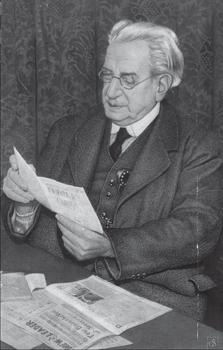Frederick William Jowett
Pioneering Socialist, founder member and
President of the ILP, Member of Parliament for
East Bradford from 1922 to 1924, and 1929 to
1931, Frederick Jowett, attended evening classes
in Weaving and Design at Bradford Technical
College during the 1880s.
 Frederick was born in Bradford in 1864. Although he
would later be inspired by the ideas of William Morris, his
Socialism stemmed from witnessing the constant struggle
of his hardworking parents against poverty and insanitary
conditions, which saw 2 of his 7 siblings die in infancy. The
family only survived because Fred and the other 2 eldest
children started work at the mill where their father was
foreman when they were only 8.
Frederick was born in Bradford in 1864. Although he
would later be inspired by the ideas of William Morris, his
Socialism stemmed from witnessing the constant struggle
of his hardworking parents against poverty and insanitary
conditions, which saw 2 of his 7 siblings die in infancy. The
family only survived because Fred and the other 2 eldest
children started work at the mill where their father was
foreman when they were only 8.
Fred was made overlooker when he was 22 and studied
Weaving and Design in the evenings at Bradford Technical
College which enabled his promotion to manager of William
Leach’s mill. But a different sort of leadership beckoned.
Following his support for the Manningham Mills strikers, in
1892 he was instrumental in setting up the Labour Church
in Bradford, was the first Socialist to be elected to Bradford
council and along with Margaret McMillan, was one of the
founder members the Bradford Branch of the Independent
Labour Party in 1892. The urgent needs of reforming work
on the Council conflicted with his employment and the
mill’s owner promised to double his salary if he would give
up politics and devote himself to the mill. ILP members
contributed to a fund that paid Fred £2 per week to support
his family so he could give up his textiles career and devote
all his attentions to the necessary work in Bradford for the
next 15 years.
In the 1900 General Election Fred was narrowly beaten
as an ILP candidate due to his vocal opposition to the
Boer War, although as a councillor he made significant
improvements locally which became national models,
introducing free school meals and council housing in place
of the city’s worst slums. Fred was elected MP for Bradford
East in 1906 and used his maiden speech to argue that free
school meals should be extended throughout the country.
JB Priestley was such an admirer of Fred that many years
later he wrote “I wish I had known Fred Jowett intimately,”
recalling his father’s close acquaintance when Fred set up
the country’s first ever school meals at Green Lane School
where he was head. Priestley described Fred as a great but
underestimated man of great integrity.
He stuck fast by his principles, never clinging to power if
it meant compromising his deeply held Socialist beliefs.
He was elected Chairman of the ILP in 1909, though he
later resigned following a dispute about policy with Ramsay
McDonald. He lost his seat at the General Election in 1918,
when his opposition to WWI proved unpopular, although he
had always supported the troops but argued against the war.
He was re-elected in 1922 and became First Commissioner of
Works in Britain’s first Labour government in 1924 but lost his
seat in the General Election later that year.
His report Socialism in Our Time produced in 1926, called
for a national minimum income and full Socialism but this
was not endorsed by Ramsay MacDonald, generating a rift.
Although Fred was re-elected in 1929 he was not given
a cabinet position. Jowett opposed the formation of the
National Government and as a result lost his seat in the
1931 General Election. The following year Jowett and the
Independent Labour Party broke with the Labour Party.
Fred and the ILP opposed Britain’s involvement in WWII.
Fred had devoted so much of his political career to arguing
against war but did not live to see the end of hostilities,
dying in February 1944.
Copyright picture courtesy of the Telegraph & Argus, Bradford